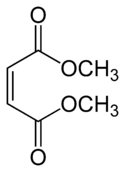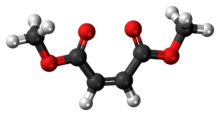Dimethyl maleate
Dimethyl maleate is an organic compound with the formula C6H8O4. It is the dimethyl ester of maleic acid.
 | |
 | |
| Names | |
|---|---|
| Preferred IUPAC name
Dimethyl (2Z)-but-2-enedioate | |
| Other names
Dimethyl maleate Maleic acid dimethyl ester Methyl maleate sipomer DMM 2-Butenedioic acid, dimethyl ester 2-Butenedioic acid (Z)-,dimethyl ester | |
| Identifiers | |
3D model (JSmol) |
|
| 471705 | |
| ChEBI | |
| ChEMBL | |
| ChemSpider | |
| ECHA InfoCard | 100.009.862 |
| EC Number |
|
PubChem CID |
|
| RTECS number |
|
| UNII | |
CompTox Dashboard (EPA) |
|
| |
| |
| Properties | |
| C6H8O4 | |
| Molar mass | 144.13 g/mol |
| Appearance | clear, colorless, oily liquid |
| Density | 1.15 g/cm3 |
| Melting point | −17 °C (1 °F; 256 K) |
| Boiling point | 204 to 207 °C (399 to 405 °F; 477 to 480 K) |
| slightly soluble | |
| Hazards | |
| GHS pictograms |   |
| GHS Signal word | Danger |
GHS hazard statements |
H302, H314, H317, H335 |
| P260, P261, P264, P270, P271, P272, P280, P301+312, P301+330+331, P302+352, P303+361+353, P304+340, P305+351+338, P310, P312, P321, P330, P333+313, P363, P403+233, P405, P501 | |
| NFPA 704 (fire diamond) | |
| Flash point | 95 °C (203 °F; 368 K) |
Except where otherwise noted, data are given for materials in their standard state (at 25 °C [77 °F], 100 kPa). | |
| Infobox references | |
Synthesis
Dimethyl maleate can be synthesized from maleic anhydride and methanol, with sulfuric acid acting as acid catalyst, via a nucleophilic acyl substitution for the monomethyl ester, followed by a Fischer esterification reaction for the dimethyl ester.
Applications
Dimethyl maleate is used in many organic syntheses as a dienophile for diene synthesis. It is used as an additive and intermediate for plastics, pigments, pharmaceuticals, and agricultural products. It is also an intermediate for the production of paints, adhesives, and copolymers.[1]
Dimethyl maleate has also found use in applications where improvements in the hardness and toughness of polymer films are desired. This includes, in particular, the improvement of anti-blocking properties of copolymers of vinyl acetate with DMM. It is also used as an internal modifier to increase the glass transition temperature of styrene or vinyl chloride polymers.[2]
Chemistry
Hydrolysis of dimethyl maleate gives maleic acid, or possibly the maleic acid monomethyl ester. Hydration of the same compound gives malic acid.
See also
References
- "Dimethyl maleate", Chemical Land 21
- "Dimethyl maleate Archived 2008-07-24 at the Wayback Machine", Bimax Chemicals Ltd.
